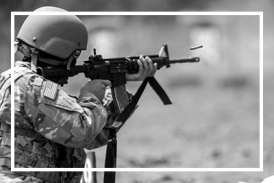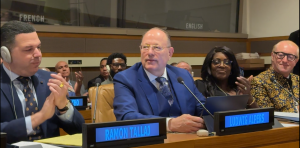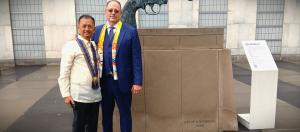The Way to Happiness International President Addresses United Nations on International Day of Living Together in Peace
Ludwig Alpers Calls on World Leaders to Adopt Proven Ethical Principles for Conflict Prevention
"This is not just a call for peace. It is a global realignment of conscience — reawakening what we never truly lost," Alpers declared.
Drawing from The Way to Happiness—a non-religious, non-political moral guide with 21 common sense precepts—Alpers emphasized the immediate and global relevance of Precept 20: Try to Treat Others as You Would Want Them to Treat You. He introduced the concept of 'mirror-based leadership', a practice where leaders reflect on their own behaviors, actions, and impact on others to improve their leadership effectiveness and create a positive organizational culture. This, he argued, could be a working model for diplomacy, policy, and daily life.
The urgency of his message was supported by sobering global data: 275 million people used drugs in 2021 with 39.5 million now suffering from substance use disorders, according to UNODC. Three-quarters of the global population live under restrictions to religious freedom, per Pew Research, while global military spending exceeded $2.2 trillion in 2023. UNESCO reports that 125 million children are out of school due to conflict, and the U.S. Surgeon General has determined that social disconnection is now as harmful to health as smoking 15 cigarettes a day.
"These aren't just statistics," said Alpers. "They're symptoms of a global loss of trust, stability, and shared values. We can't legislate character—but we can teach it."
The Way to Happiness, written by humanitarian and author, L. Ron Hubbard, has now reached over 140 million copies, translated into 126 languages, and distributed in 190 countries. Its precepts are currently applied in schools, correctional institutions, law enforcement training, and community rebuilding initiatives.
The conference was hosted by Dr. Bernard Fialkoff, President of the Time for Truth Foundation, who opened the forum with a stirring reminder:
"We do not convene today merely to exchange words. We are here to unite... and implement. This is the convergence of conscience."
The event's international significance was highlighted by a distinguished roster of speakers representing five continents and a wide spectrum of disciplines. President Ali Gedikoglu of COJEP International spoke on justice, women's empowerment, and family integrity. Dr. Hong Tao-Tze of FOWPAL addressed spiritual conscience as the core of peace. Dr. Ben Graham, White House Religious Advisor, discussed religious freedom and moral governance. Salwa Kader of IFPAD focused on interfaith cooperation and the protection of children.
Additional speakers included Colonel Otto Padron of the U.S. Army on the role of veterans in sustaining peace, Dr. Paul Monözca of Bank of Humanity on ethical economics and strategic conscience, Governor Eduardo Alas of El Salvador on values-led public service, and Rafael "Bomba" Brito, media icon, on the power of ethical art and broadcasting. Dr. Hector Guevarra, Dr. Mario Pinel, Fred Smith, Rabbi Itzhak Yehoshua, and others each reinforced that peace is impossible without ethical foundations.
The event concluded with the showing of a one-minute public service announcement on The Way to Happiness booklet's "Precept 18: Respect the Religious Beliefs of Others", a powerful reminder that tolerance is essential to community stability and international harmony.
This year's International Day of Living Together in Peace will not be remembered as another ceremonial gathering, but as a turning point—where global leaders acknowledged that character, not just policy, shapes the future of nations.
Download a free Educator's Resource Kit at https://www.thewaytohappiness.org/request-info/educators-resource-kit.html
Media Relations
The Way to Happiness Foundation
+1 818-402-3318
info@twth.org
Legal Disclaimer:
EIN Presswire provides this news content "as is" without warranty of any kind. We do not accept any responsibility or liability for the accuracy, content, images, videos, licenses, completeness, legality, or reliability of the information contained in this article. If you have any complaints or copyright issues related to this article, kindly contact the author above.
Micro Drone Market Growth Insights and Statistical Analysis to show Expanding Industry Size
Morepen Laboratories Limited Expands to UAE: Step-Down Subsidiary in Dubai Mainland Support from Start Any Business
Upcycled Micro-Machines Go Global: Mecrob® Debuts as W.A.Y Studio’s New Art Brand
Więcej ważnych informacji
 Jedynka Newserii
Jedynka Newserii

 Jedynka Newserii
Jedynka Newserii

Polityka

D. Joński: Nie wiemy, co zrobi Rosja za dwa–trzy lata. Według duńskiego wywiadu może zaatakować kraje nadbałtyckie i musimy być na to gotowi
Zdecydowana większość krajów unijnych wskazuje na potrzebę wzmocnienia zdolności obronnych Europy w obliczu coraz bardziej złożonego geopolitycznego tła. Wywiady zachodnich państw wskazują, że Rosja może rozpocząć konfrontację z NATO jeszcze przed 2030 rokiem. Biała księga w sprawie obronności europejskiej „Gotowość 2030” zakłada m.in. ochronę granic lądowych, powietrznych i morskich UE, a sztandarowym projektem ma być Tarcza Wschód. – W budzeniu Europy duże zasługi ma polska prezydencja – ocenia europoseł Dariusz Joński.
Transport
Duże magazyny energii przyspieszą rozwój transportu niskoemisyjnego w Europie. Przyszłością może być wodór służący jako paliwo i nośnik energii

Zmiany w europejskim transporcie przyspieszają. Trendem jest elektromobilność, zwłaszcza w ramach logistyki „ostatniej mili”. Jednocześnie jednak udział samochodów w pełni elektrycznych w polskich firmach spadł z 18 do 12 proc., co wpisuje się w szerszy europejski trend spowolnienia elektromobilności. Główne bariery to ograniczona liczba publicznych stacji ładowania, wysoka cena pojazdów i brak dostępu do odpowiedniej infrastruktury. – Potrzebne są odpowiednio duże magazyny taniej energii. Przyszłością przede wszystkim jest wodór – ocenia Andrzej Gemra z Renault Group.
Infrastruktura
W Polsce w obiektach zabytkowych wciąż brakuje nowoczesnych rozwiązań przeciwpożarowych. Potrzebna jest większa elastyczność w stosowaniu przepisów

Pogodzenie interesów konserwatorów, projektantów, inwestorów, rzeczoznawców i służby ochrony pożarowej stanowi jedno z największych wyzwań w zakresie ochrony przeciwpożarowej obiektów konserwatorskich. Pożary zabytków takich jak m.in. katedra Notre-Dame w Paryżu przyczyniają się do wprowadzania nowatorskich rozwiązań technicznych w zakresie ochrony przeciwpożarowej. W Polsce obowiązuje już konieczność instalacji systemów detekcji. Inwestorzy często jednak rezygnują z realizacji projektów dotyczących obiektów zabytkowych z uwagi na zmieniające się i coraz bardziej restrykcyjne przepisy czy też względy ekonomiczne.
Partner serwisu
Szkolenia

Akademia Newserii
Akademia Newserii to projekt, w ramach którego najlepsi polscy dziennikarze biznesowi, giełdowi oraz lifestylowi, a także szkoleniowcy z wieloletnim doświadczeniem dzielą się swoją wiedzą nt. pracy z mediami.






![Nestlé w Polsce podsumowuje wpływ na krajową gospodarkę. Firma wygenerowała 0,6 proc. polskiego PKB [DEPESZA]](https://www.newseria.pl/files/1097841585/fabryka-nesquik_1,w_85,r_png,_small.png)



.gif)

 |
| |
| |
|